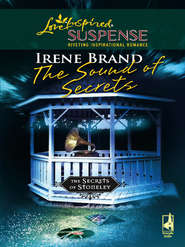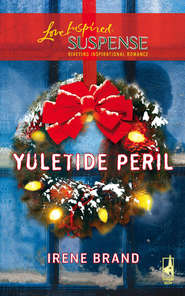По всем вопросам обращайтесь на: info@litportal.ru
(©) 2003-2024.
✖
The Christmas Children
Автор
Год написания книги
2019
Настройки чтения
Размер шрифта
Высота строк
Поля
“I sold my clothing design business a few months ago, and when I was cleaning out the office and storage room, I found a trunk that my grandmother had left to me. My uncle had shipped it to me after her death. There wasn’t anything valuable in it—mostly memorabilia that I’d kept since my school years. I trashed most of the things, but I kept this—”
She picked up the white key, and Paul thought Carissa had forgotten his presence as her mind took her quickly down memory lane.
“When I was about six, I participated in a program at our church, and I carried this Key to Christmas. I went from place to place trying to fit the key into a lock, and when I finally found a door the key would open, a nativity scene was revealed. When I came across this key a month ago, I realized how far I’d strayed from the teachings I’d learned as a child. I knew then that I had to find a wintery place to relive the Christmases of my childhood. I didn’t want to return to Minnesota because it doesn’t hold pleasant memories for me. Besides, all of my close relatives have died. It seemed like a coincidence that Naomi wanted to change locations at the same time I did.”
“As far as that’s concerned, I need to be reminded of what Christmas really means, too. Carissa, I hope you can revive the meaning of Christmas that you once knew. Maybe we can find it together.”
Their eyes met and held for a minute before Carissa looked away, too confused to even answer. She swirled the liquid in her glass, thinking that she was acting like a child.
“I guess it’s time for me to go,” Paul said. “I’m getting sleepy now. And you must be tired, too, unless you slept while I was napping earlier.”
She shook her head. “No, I didn’t sleep. I unloaded the car and settled in. Thanks for coming over tonight.”
She held out her hand to him, and, unsuccessfully stifling his amazement, he tenderly clasped her hand in his.
Without meeting his gaze, she said, “Your gesture in the doctor’s office took me by surprise, or I wouldn’t have reacted so foolishly.”
“It was just a friendly gesture,” he assured her.
“I know. A foolish quirk of mine caused my reaction. I’ll tell you about it someday. And I hope we can become friends.” With a warm grin, she added, “It’s always a good idea to make friends with your next-door neighbor.”
Carissa fell asleep easily, not even worrying about the unlocked back door; she felt protected with Paul nearby. But she woke up suddenly, about the same time she’d awakened when Paul had entered the house the night before.
She’d heard something. Carissa sat up in bed to listen. The sound seemed to come from the kitchen, and she eased out of bed, wishing she’d kept the poker upstairs. Vowing that she would secure the back door before another night, Carissa ran quickly and silently downstairs.
When she reached the last step, she said, “Who’s there?”
She heard a gasp and a scurry of feet.
Too frightened to be careful, Carissa snapped on the lights and rushed into the kitchen, just in time to see the pantry door close. She pushed a table in front of that door.
Standing beside the intercom, she shouted, “Paul! Paul! I need help.”
Although it seemed like hours, it probably wasn’t more than a minute before she heard Paul’s muffled tone. Poor man! She thought, somewhat humorously, that she’d ruined another night’s rest for him.
“What’s wrong?”
“Somebody is in the house. Come help me.”
“I’ll come right away. Be careful!”
She took a knife from a cabinet drawer for protection if the intruder should break out of the pantry.
Paul rushed in the door, dressed only in pajamas and slippers, rumpled hair hanging over his agitated brown eyes.
“In the pantry,” Carissa stammered.
Without asking questions, Paul motioned. “Get behind me.”
He pushed the table away and swung open the door, his body hunched forward, ready to attack if necessary.
“Come out!” Paul commanded.
Nothing could be heard for moments except Paul’s heavy breathing. Then there was a scuffling of feet, and Carissa stared, slack-jawed, disbelief in her eyes. Beyond words, she lowered the knife.
A teenage boy sauntered out of the pantry, followed by a little girl who held one of the red apples that Carissa had stored in the pantry. Another girl, probably eight or ten years old, peered around them, holding in her arms the teddy bear that Carissa had seen beside the fireplace the night she’d arrived.
The knife slipped from Carissa’s hand and clattered to the floor. She pulled out a chair from the table and slowly lowered herself into it to support her shaking legs.
“Any more where you came from?” Paul asked, peering into the pantry.
The boy shook his head. The smallest girl handed the apple to Paul; the other child started crying.
Carissa’s body trembled and a wave of nausea seized her. She dropped her head into her hands. She’d come to Yuletide looking for solitude so that she could experience a renewal of mind and spirit. She hadn’t had a minute of peace since she arrived. Within twenty-four hours, four people had invaded her house.
What had given her the foolish idea to look for Christmas in Yuletide?
Chapter Four
The children bore a marked resemblance to each other, so they were obviously siblings. Of slight stature and build, the children had light brown hair and dark brown eyes. The oldest girl wore glasses, and the boy had a blue cap on his head. The smallest child sidled close to the teenage boy, and he put his arm around her.
Speechless, Carissa stared at the three children.
Paul recovered his composure more quickly than she did, and he asked, “What are you kids doing here?”
The smallest child looked at Paul fearlessly, but the boy dropped his head.
“Tell me,” Paul insisted. “Who are you and what are you doing here?”
Carissa noticed that the children were shaking, and she doubted it was all from fear.
The older girl’s sobs sounded as loud as thunder, and they reached a soft spot in Carissa’s heart. “Just a minute, Paul,” she said.
The children seemed malnourished, and the sorrow in their eyes was unmistakable. Their clothes were worn out, and not very clean. She moved to the sobbing girl and knelt beside her.
“Are you hungry?”
Without looking up, the girl nodded. Paul and Carissa exchanged looks of compassion. Suddenly, Carissa realized why there had been so little food in the refrigerator when she arrived. These kids had broken into the house and had been living off the food Naomi had left. Carissa’s arrival had probably kept them from getting any food for the past two days.
She knew that the sensible thing to do was to call the police, but Carissa suddenly remembered her own impoverished childhood. She couldn’t turn these children away until she learned what circumstances had brought them here.
“Then you sit at the table, and we’ll fix something for you to eat. Paul, if you’ll warm milk for hot chocolate, I’ll make sandwiches.”
The children scuttled toward the table.
“That’s my chair, Lauren,” the smallest child said, and preempted the chair the older girl had started to take.
Paul and Carissa exchanged amused glances. As he opened the refrigerator door, Paul said in an undertone, “Apparently, they’ve eaten here before.”











